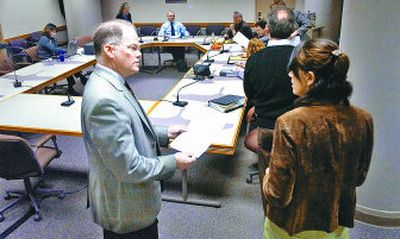Spokane’s new No. 2 gets high marks

Spokane isn’t second nature to the city’s new administrative leader, at least not yet.
“I still have to pull up MapQuest when I’m going to a particular elementary school,” said John Pilcher, who was named the city’s No. 2 official last month by Mayor Dennis Hession.
Pilcher, 45, arrived in Spokane a few years ago newlywed but without a job. His rise to the top at City Hall has been swift and, he said, unexpected.
He replaced Deputy Mayor Jack Lynch on March 1 after a two-year tenure in the city’s economic development department. He had been serving as the city’s No. 2 on an acting basis since Lynch went on medical leave in late December. At the time of Lynch’s firing, Hession said he needed a deputy who could work at a higher level. The mayor also changed the title of the position to chief operating officer.
“I found John to be the most talented person with the greatest business and organizational skills of anyone in this organization,” Hession said Thursday.
Praise for Pilcher from City Council members – even critics of Hession – reads like the back of a book cover.
“He’s wonderful,” said Councilwoman Nancy McLaughlin. “I just hope he doesn’t burn out because he’s trying to do such an awesome job.”
“He’s one of the people you can work with,” said Councilman Bob Apple.
Pilcher is “very thorough” and has a “great vision,” said Councilman Brad Stark. “He knows how to translate that vision into action.”
Stark said he recently sent Pilcher an e-mail after 11 p.m. on a city issue. He got an immediate response.
At City Hall
Former Mayor Jim West selected Pilcher to lead the city’s economic development department in early 2005. Pilcher had been working as a consultant in Spokane for ConoverBond, a local development company, after he and his wife decided to move to the Inland Northwest to start a family. They now have a 3-year-old daughter.
Pilcher said he hopes to implement a system citywide to more quickly respond to citizen inquiries, copying an initiative he started in the economic development department.
“I’m not sure we have good systems in place to respond to our citizens,” he said. “We’re trying to build systems to help close the loop.”
Pilcher said other accomplishments during his tenure over economic development include the creation of a strategic plan for the department, implementing a new permit system and working with Kendall Yards to help make the proposed 78-acre development near downtown a reality.
Councilman Al French, who is running for mayor against Hession, said the city’s economic development department under Pilcher was too slow in implementing the permit system and in assisting Kendall Yards developers.
French said he’s not sure he would keep Pilcher in the post if he were elected mayor.
“It was a problem of the leadership,” French said. “At this point I don’t know if decisions were his decisions or the decisions of those above him.”
Others, however, have criticized the city for moving too fast to gain approval for Kendall Yards. Spokane’s former public works director, Roger Flint, for instance, told the mayor that he felt he was pressured to become an “advocate” for the project.
Pilcher said that criticisms from both sides might indicate that the city was moving at the correct speed.
“It would have been great if it could have been faster, but we had regulatory requirements that we had to fulfill,” Pilcher said.
Hession said French’s assertions that the department moved too slow are “absolutely not true.”
“John Pilcher worked double-time on Kendall Yards,” Hession said.
Climbing mountains
Pilcher, who grew up in Puyallup, earned a bachelor’s degree at the University of Puget Sound and a master of business administration at Harvard University.
He worked for Glacier Park Co., a holding company for Burlington Northern Railroad properties, and spent several years working in real estate and development. Pilcher spent three years in the late 1990s at the Port of Seattle, eventually supervising more than 100 employees.
Pilcher, who earns about $139,000 a year, said he thinks there’s some advantage to being new to the city and from spending most of his career outside government.
“The private sector has to be accountable. In the public sector, it’s harder to measure your results,” Pilcher said. “I don’t think you can run a government like a business, but I think you can provide more accountability.”
The last time Pilcher held the title of chief operating officer, however, things didn’t go so well. That’s when he spent a year in the early 2000s working for start-up Sunhawk.com. In the dot-com bust, Sunhawk dumped most of its Seattle work force and subcontracted work with affiliates in London and Russia. The company later merged with a California firm.
In the city press release announcing his new job, it was noted that “he has climbed mountains on four continents, including a 21-day solo ascent of Denali in Alaska.”
Pilcher said besides a climb in South America a couple years ago, his days scaling cliffs have been numbered since moving to Spokane.
“That’s my mountain for 2007: to help improve the great city of Spokane,” Pilcher said.